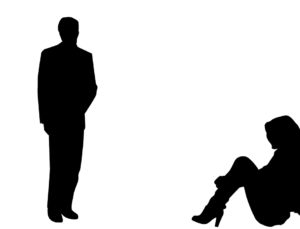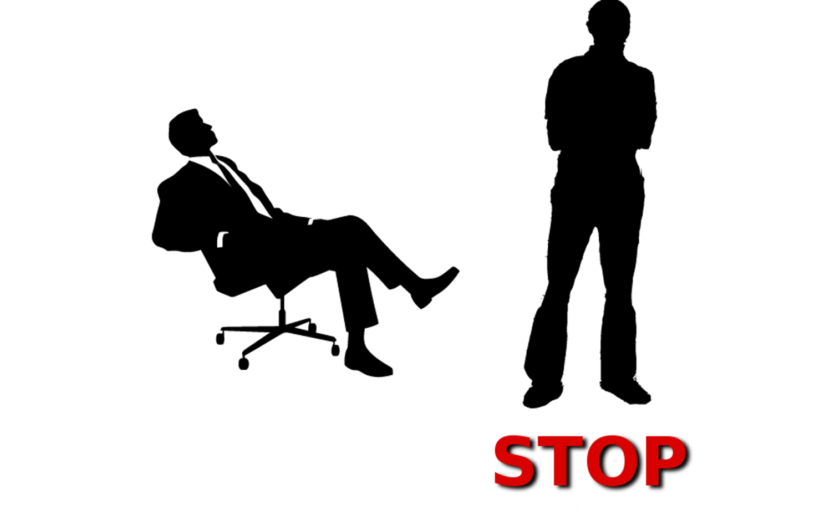Do you get the attention you deserve? Often, people contact me because they feel invisible, ignored, or disrespected. You probably understand.
More often than not, if someone isn’t getting attention, it’s because they don’t want it.
If you try to blend in you probably will. If you try not to make waves, you probably won’t. If you don’t stand up, it’s hard to stand out.
Public speaking isn’t just about formal presentation skills. The best presentation techniques apply on stage, in a public speaking setting, or even in informal communication situations.
The Public Speaking STANDard
 Today’s presentation technique really is that simple:
Today’s presentation technique really is that simple:
Stand up!
I’m not asking you to grand-stand, or head-stand.
Just stand.
You already know this, so before you stop reading, ask yourself–do you ever remember sitting down while you made comments or suggestions at a meeting?
Why were you sitting?
The answer is simple: because you didn’t want to stand out.
To stand out without standing up, you’re almost completely dependent on your rhetorical skills. Are your rhetorical skills good enough to make the right impression all by themselves?
Maybe. Maybe not. You tell me.
The STANDard for public speaking is to stand.
To STAND?
I’m guessing that you understand the point of standing for a keynote, or a formal presentation, but I’m asking you to stand more often at a meeting, or a sales pitch, or an informal conversation.

Why?
ATTENTION – When you stand up, you stand out. You grab attention. Subconsciously, people automatically pay attention to the biggest thing, the thing in the spotlight, and the thing that moves. When you stand, you do all three: move, inject yourself into the spotlight, and get bigger.
AUTHORITY – Studies have shown over and over again that your confidence matters more than your words. If you feel any uncertainty about standing, then you prove the point that standing requires confidence. When you show that confidence, even if it’s forced, you are more persuasive.
AUTHENTICITY – Not only do you get more authority, but you appear more authentic. Assuming it’s not completely scripted, when you come out from behind the table you become more vulnerable. Standing allows people to see your mistakes (and your waistline). If you do it right, standing gives you genuine brownie points.
BODY LANGUAGE – Words by themselves convey only part of your message. When you sit down you are artificially limiting your body language to facial expressions and tightly restrained hand gestures. By freeing yourself from confined spaces, you free your body to help with your words. You don’t have to try to add body language. It will happen naturally.
RESULTS – Unless you’re in a complex, unfamiliar situation, you’ll actually perform better standing up due to a psychological principle called the “audience effect.” When you make yourself the center of attention, you’ll automatically perform better. The science says so. That means in most situations, standing will make you appear more clear, more prepared, and more polished, even if you don’t feel it.
Check out my SpeechDeck public speaking techniques card deck for complete details on these principles. The two principles that benefit the most from standing I call “Revealing the Messenger” and “Managing the Theater.”
or NOT to Stand?
Yes there are exceptions.
Obviously, if you go out to lunch to meet a new potential business partner, you will make everyone uncomfortable if you stand up at the table in the middle of the restaurant.
BUT, it might be perfectly appropriate to stand at the table when you’re out with coworkers or friends who already know you.

The difference is the existing relationship. You want to stand out, but you don’t want to break rapport.
To stand or not to stand? The answer depends on what’s more important to you: standing out or fitting in.
If you’re given the floor, especially as an assignment, you are expected to stand out. In a formal presentation you should almost always stand out and therefore stand up.
If you already have rapport with your audience, such as coworkers, friends, or members of a social group, you can usually stand. People who already know you won’t be offended if you stand up–because they know you. You get all of the benefits of standing with little downside. It might be unusual the first few times, but since they know you already, their judgement of you is not based on the standing.
BUT, if you have NOT already built rapport with the audience, be careful. Your relationship matters more than standing up.
The question: To stand or not to stand?
The answer: Stand as much as you can get away with without jeopardizing your relationship.
Standing without Standoffishness
Sometimes it seems awkward to stand. I get it! What if everyone else is sitting? What is the group leaders or supervisor asks you to sit? What if it makes people uncomfortable?
 Don’t do it if it puts people off, because if it puts people off you’re doing it wrong.
Don’t do it if it puts people off, because if it puts people off you’re doing it wrong.
The determination to stand is not about if YOU are uncomfortable, it’s about whether or not the LISTENER is uncomfortable. No matter how it feels to you, don’t make THEM feel awkward.
If your standing is awkward to the audience, it’s because they don’t see the purpose to it. The solution? Give your standing a purpose!
Find an excuse to stand
Here are some possible excuses:
- To write on a flipchart or whiteboard
- To point to a slide or object
- To hand out materials
- To demonstrate something with more space
- To setup a physical prop
- To move an object/prop/paper/etc under the light
- To comment on someone else’s writing or prop
- “Because I want my back to … “
- “Because I feel more comfortable standing”
- “Because I talk with my hands”
- “Because I can’t see all of you sitting”
- “Because I want your attention”
- and so on …
I’m betting you remember seeing the boss use that last one–standing just to exert authority. He/she didn’t need any reason other than “Everybody listen up!”
Of course that only proves my point. For that woman or man that you remember standing–standing worked. Otherwise, you wouldn’t remember it. Did they stand because they had authority, or did they have more authority because they stood? It works both ways.
I’m talking about public speaking skills. I’m talking about PowerPoint presentation skills. I’m talking about informal meeting skills. I’m talking about all of the above.
If you want more attention, more authority, and more influence, find an excuse to stand up. Stop under-achieving. Stop under-stating. Stop under-standing!

